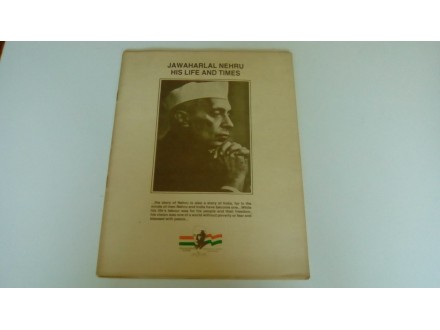Jawaharlal NEHRU His life and times fotomonografija
| Cena: |
999 din
|
| Prodavac je na odmoru do 01.02.2026. | |
| Želi ovaj predmet: | 2 |
| Stanje: | Nekorišćen |
| Garancija: | Ne |
| Isporuka: | Pošta Lično preuzimanje |
| Plaćanje: | Tekući račun (pre slanja) Lično |
| Grad: |
Beograd-Dobanovci, Beograd-Surčin |
ISBN: Ostalo
Godina izdanja: -
Autor: Domaći
Jezik: Engleski
dvojezična
na engleskom i srpskom
bogato ilustrovana
veliki format
kao nova
godina izdanja i izdavač nepoznati
Jawaharlal Nehru (/ˈneɪru, ˈnɛru/;[1] Hindi: [ˈdʒəʋaːɦərˈlaːl ˈneːɦru] (About this soundlisten); 14 November 1889 – 27 May 1964) was an Indian independence activist and, subsequently, the first prime minister of India. Considered one of the greatest statesmen of India[2] and of the twentieth century,[3] he was a central figure in Indian politics both before and after independence. He emerged as an eminent leader of the Indian independence movement, serving India as Prime Minister from its establishment in 1947 as an independent nation, until his death in 1964. He was also known as Pandit Nehru due to his roots with the Kashmiri Pandit community, while Indian children knew him better as Chacha Nehru (Hindi: Uncle Nehru).[4][5]
The son of Swarup Rani and Motilal Nehru, a prominent lawyer and nationalist statesman, Nehru was a graduate of Trinity College, Cambridge and the Inner Temple, where he trained to be a barrister. Upon his return to India, he enrolled at the Allahabad High Court and took an interest in national politics, which eventually replaced his
Blegal practice. A committed nationalist since his teenage years, he became a rising figure in Indian politics during the upheavals of the 1910s. He became the prominent leader of the left-wing factions of the Indian National Congress during the 1920s, and eventually of the entire Congress, with the tacit approval of his mentor, Mahatma Gandhi. As Congress President in 1929, Nehru called for complete independence from the British Raj and instigated the Congress`s decisive shift towards the left.
Nehru and the Congress dominated Indian politics during the 1930s as the country moved towards independence. His idea of a secular nation-state was seemingly validated when the Congress swept the 1937 provincial elections and formed the government in several provinces; on the other hand, the separatist Muslim League fared much poorer. However, these achievements were severely compromised in the aftermath of the Quit India Movement in 1942, which saw the British effectively crush the Congress as a political organisation. Nehru, who had reluctantly heeded Gandhi`s call for immediate independence, for he had desired to support the Allied war effort during World War II, came out of a lengthy prison term to a much altered political landscape. The Muslim League under his old Congress colleague and now opponent, Muhammad Ali Jinnah, had come to dominate Muslim politics in India. Negotiations between Congress and Muslim League for power sharing failed and gave way to the independence and bloody partition of India in 1947.
Nehru was elected by the Congress to assume office as independent India`s first Prime Minister, although the question of leadership had been settled as far back as 1941, when Gandhi acknowledged Nehru as his political heir and successor. As Prime Minister, he set out to realise his vision of India. The Constitution of India was enacted in 1950, after which he embarked on an ambitious program of economic, social and political reforms. Chiefly, he oversaw India`s transition from a colony to a republic, while nurturing a plural, multi-party system. In foreign policy, he took a leading role in the Non-Aligned Movement while projecting India as a regional hegemon in South Asia.
Under Nehru`s leadership, the Congress emerged as a catch-all party, dominating national and state-level politics and winning consecutive elections in 1951, 1957, and 1962. He remained popular with the people of India in spite of political troubles in his final years and failure of leadership during the 1962 Sino-Indian War. In India, his birthday is celebrated as Children`s Day.
Knjige šaljem preporucenom tiskovinom ( cenovnik na sajtu pošte 138 do 211 din. u zavisnosti od tezine a maksimalno do 2 kilograma,iznad 2 kilograma do 30 kilograma paket po ceni od 340 pa naviše u zavisnosti od težine,po želji moze i nekom od kurirskih službi- uz uplatu unapred)
Troškove poštarine uvek snosi kupac-sem ako to nije navedeno
Šaljem u inostranstvo kao preporučenu tiskovinu i M vreću cenovnik zavisi od težine a možete ga pogledati na sajtu pošte-uplate preko WesternUnion transakcije
Obogatite svoju biblioteku dobrom knjigom( da se razumemo --ne postoji loša knjiga-samo su nam interesovanja različita)
U ponudi raznovrsni žanrovi ,na raznim jezicima,nove,polovne,za mladje,za one malo starije.
Edukativne,maštovite i nadasve zanimljive knjige uz koje su neki odrastali,odrastaju, a neki će tek odrastati.
Nikada neće izaći iz mode,uvek u korak sa napretkom,korak ispred svog vremena.
Krasile su naše police i krasiće ih još mnogo,mnogo vremena.
Ovo nije preporuka dana,nedelje ili možda meseca-već preporuka za ceo život.
Ponekad bake i deke čitaju svojim unucima,neretko bude i obrnuto.
Uživajte u životu-maštajte,jer čarolija nikad ne prestaje.
Ne sudi o knjizi po koricama!
Lično preuzimanje na adresi u Dobanovcima.
▶ ➔ ➘ ➙ ➚ ➛ ➜ ➝ ➞ ➟ ➠ ➡ ➢➣ ➤ ➥ ➦ ↪ ↩ ↚ ↛ ↜ ↝ ↞ ↟ ↠ ⚜ ✥ ✤ ✻ ✼ ✽ ✾ ❀ ✿ ❁ ❃ ❇ ❈ ❉ ❊ ❋ ⚘ ⁕ ꙮ ꕤ ꕥ ☘ ♥ ☺
Pogledajte i ponudu na:
https://www.kupindo.com/pretraga.php?Prodavac=Parfemi12&Grupa=89
Ukoliko i tamo nešto pronađete, mogućnost objedinjeno slanja , tako i dodatnog popusta ♥♥♥♥♥♥
Predmet: 67869541











